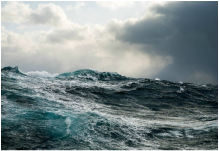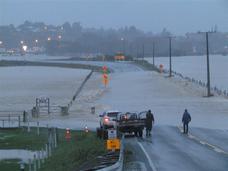


A series of opinion pieces on, mostly climate change and related subjects to do with New Zealand.
 A recent paper by James Hansen and 18 other scientists showed that there was a strong possibility of major storms in the Atlantic that were likely to be way outside the experience of modern history. The extra power of these storms was caused by the rise in temperature of the world and the changing differential between the poles and the equator would give them extra strength.  The situation in the Southern hemisphere is likely to be more extreme than the Atlantic, where the research evidence was found. The Antarctic continent is very high and continues to be very cold while the Equator continues to warm which increases the temperature differential between the two regions. We are already seeing signs of this with the 20% increase in the proportion of Westerly winds in New Zealand and the increase in winter sea ice surrounding the Antarctic, which is caused by stronger winds blowing the ice away from the continent.  The problem for New Zealand is that the South Island lies in the path of the roaring forties and is in the direct path of the route these powerful storms would travel. While the mountains on the West coast mostly protect the more heavily populated Eastern areas, there are still a lot of people and infrastructure that would be exposed to risk. Towns like Invercargill, Bluff and Dunedin and even Wellington, might have to re-evaluate their climate change strategy to accommodate the damage that a hurricane sized storm can do.
7 Comments
Bob Bristow
30/5/2016 04:54:49 pm
Stuff.co.nz highlighting coastal erosion in New Zealand, which we will experience increasingly as the century progresses.
Reply
Andy Wilkins
1/6/2016 02:53:59 am
It's nothing to do with "stronger winds" blowing ice around. Latest research show that Antarcica is not going to experience any global warming for a long time yet:
Reply
Bob Bingham
1/6/2016 11:29:36 am
Andy you are mistaken in your interpretation of the report on the circulation of the Ocean Conveyor. What the report said was that the water that is surfacing in the Southern Ocean is centuries old and has not been warmed by modern temperatures and neither has it absorbed the modern levels of CO2. What causes the stronger winds is the increasing differential between the Antarctic and the Equator. Watch Hansens video.
Reply
Andy Wilkins
2/6/2016 01:30:56 am
From the abstract of Hansen'd paper:
Reply
This is very interesting but the theory of CO2 being the driver of warming has not been proven regardless of what Hansen and other climate scientists claim. The earth has been warming since the ice age. Some "warmers" state that the warming slowed down or stopped around the start of the industrial era of 1900. That is simply not true. Warming has continued at nearly the same pace as before the industrial era. Proof of that is shown in the evidence of the river Tornio in Finland. This river has been monitored and data recorded for the earliest ice breakup each year from 1693 to 2000. That data and graph show that the northern hemisphere has been warming on an average basis for 307 years. Of course, there have been cycles of cooling followed by warming during that time. What is significant is that the graph furnished shows that the the rate of warming has not changed. It remains at the same rate during the industrial era of 1940 to the present. The graph does not show and inverted "Hockey Stick" to indicate that temperatures are increasing at a faster rate. The other point is that since the earth's temperature has been increasing on average continuously since 1693, then the ocean temperature has also increased. That indicates that the waters around Antarctica would also be warmer. Yet, this article attempts to claim that the winds and oceans are keeping Antarctica cooler and preventing the ice sheets to melt. Sounds suspicious to me.
Reply
Bob Bingham
24/11/2016 02:01:10 pm
Wally you need to go back to school. CO2 is a greenhouse gas and its a fact that has been proven and tested for well over a hundred years. If you cant understand that then there is no point in discussing climate change.
Reply
@Bob Bingham: Bob you need to ask yourself why many of these climate scientists find it necessary to to keep ,fudging their data in an attempt to convince people that humans and the increases in CO2 are the driver of warming the earth. Dr. Bates,a top climate scientist at NOAA, came forward as a whistle blower on his own agency's conclusions on the hottest year. The "pause" of 18 years caused the climate scientists scrambling to come up with an explanation for the "Pause". Dr. Bates states that some scientists at NOAA went back to old and inaccurate ship intake water temperatures rather than buoy temperatures which are considered more accurate. and readjusted them to fit a new analysis of temperature. Their new results showed that the "pause" didn't exist. Dr. Bates stated that the purpose of their analysis was hurried in order to be able to influence the international meeting for the Paris agreement. This fudging of data has been done several times in the past by the climate scientists and calls serious attention that their conclusions are false.
Reply
Leave a Reply. |
Bob BinghamOccasional blog posts on topical news items concerning the climate. Please click the RSS feed to receive updates. Categories
All
|
